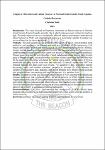Employee Motivation and Labour Turnover at National Social Security Fund, Uganda.
Abstract
Background: The study focused on Employee motivation on labour turnover in National Social Security Fund in Uganda since the rate at which employees were exiting the fund was high. The study objectives were to ascertain the effect of intrinsic and extrinsic motivation on labour turnover in NSSF with organisational policy as a moderating variable. Literature was reviewed based on the above objectives.
Methods: The study adopted a cross sectional survey design, in which a mixed method (both qualitative and quantitative techniques) was used in a population of 226 comprising of all branch staff of NSSF Uganda and sample size of 142 staff determined using Slovin’s formula. Sample random sampling method was used to select the non-supervisory staff and purposive sampling method was used to select the supervisors because of their knowledge and experience. Primary source was used for collecting data. Closed ended questionnaire ranging from strongly agree to strongly disagree was used to collect data from the non-supervisory staff and interview for the supervisors. The items were tested for validity and a content validity index of 0.9 was established indicating that the items were also valid and a Cronbach’s alpha value 0.807 was obtained meaning the items were also reliable. For quantitative data, descriptive statistic percentage, mean, and standard deviations computed to ascertain the effect between the variables. For qualitative data, analytical and critical thinking skills (themes) were used and later generalized to create meaning and was then presented in a narrative form.
Results: The analysis of the data indicated a response rate of 98.6% and that both intrinsic and extrinsic motivation had significant effects on labour turnover in NSSF Uganda whereas Organisational policy did not have a moderating influence on the relationship between intrinsic motivation, extrinsic motivation, and labour turnover. The hypotheses were therefore rejected. The study concluded that extrinsic motivation is a very important factor that determines labour turnover rate in NSSF as compared to intrinsic motivation.
Recommendations: The study recommended that management of NSSF should adopt programs that are effective in motivating their employees if they are to solve the problem of Labour turnover.
Keywords: Employee motivation, Labour turnover, National Social Security Fund

